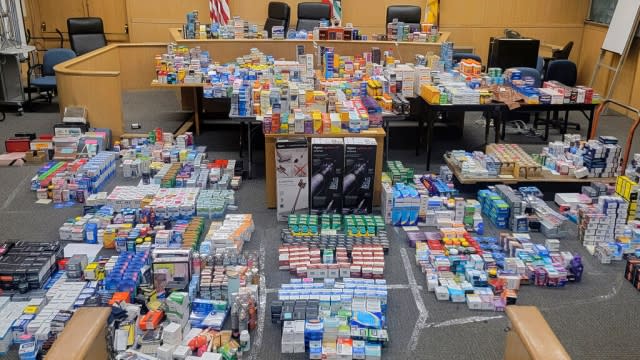Retail theft surge driving businesses to explore more safety options

It's a growing threat that has retailers across the U.S. sounding the alarm.
"How can you prevent 30 people from coming through your door and just ransacking, burglarizing an environment?" asked David Johnston, Vice President of Asset Protection and Retail Operations at the National Retail Federation.
From Los Angeles to Chicago to New York City, retail thefts have left major companies reeling, citing massive hits to profit margins and serious concerns about safety as large groups target stores.
"We're starting to see, you know, a growing number of just free-for-all, you know, large-scale groups, and whether, you know, we can call them kids, but they're not. Many of these are adults that are just going in and openly and brazenly stealing from retailers," Johnston said.
The National Retail Federation reports that in 2021, retailers reported an average increase of 26.5% in organized crime, and more than 80% reported a spike in violence and aggression associated with thefts.
Johnston says historically, companies would not discuss the impact of thefts on their bottom line, thinking it reflected a failure in their ability to control their store security.
"But what we're seeing today, we are beyond the retailer, being the individual who can correct what's happening today with the several acts of lawlessness, the brazen acts of shoplifting. This is not a retailer only solution to solve," Johnston said.
A small business owner in Portland says he has seen an 800% increase in shoplifting.
"We've gone through a lot. I actually put my hand in my pocket. Make sure my mace is available. I go to steel gates, and I have to open them with a key," Steven Lien, a Portland store owner, said.
SEE MORE: Dick's Sporting Goods blames theft for plummeting profits
From additional cameras to security cables, Johnston says stores aren't holding back on security measures.
"They're doing all that they can. They're spending more money in trying to protect their employees, their customers, and their merchandise than ever before. But it's still not enough to stop what we're seeing today," Johnston said.
But these measures don't seem to be holding back coordinated attacks.
"Now we're talking about blocking specific intersections and creating havoc outside the store, teams going in with cutting tools, going to very specific places, and attacking and stealing different areas of the store, stealing from those areas. And then again, how they are very, they then leave simultaneously and then somewhere regroup and convert all these stolen goods to cash," Read Hayes said.
Read Hayes is the director of the Loss Prevention Research Council. The Florida-based research company works with more than 70 major retail chains to find effective solutions for loss prevention.
"We have a team of 16. We've got six inside labs that can simulate store environments and/or any environment we'd like in our simulation lab. We also have outside areas that we can test and learn. And we are doing a whole lot of field testing too. So, we've got the greater part of Gainesville, Florida, as one big living lab now, but we're also going to be setting up similar capability in places like Atlanta coming up," Hayes said.
According to Hayes, part of what makes the current retail theft trends so alarming is how blatant thieves have become.
"They're not running from the crimes themselves; I review a ton of video every year where they would run. Now you see so many of them just walking away. They don't fear that there'll be any consequences of their actions, that's for sure," Hayes said.
Since 2022, a handful of states, including Illinois, Oregon, New Mexico, Indiana, and Florida, have passed tougher retail crime legislation. A federal proposal would increase penalties in cases where evidence shows multiple thefts. Experts say that while that's a step in the right direction, more still needs to be done.
"It's going to get worse before it gets better. You know, until the states themselves look at the current laws and the impact and either amend laws that were previously changed or look at new laws at tackling this new form of organized retail crime, it's going to continue," Johnston said.
